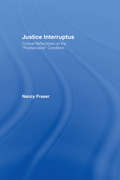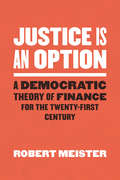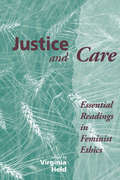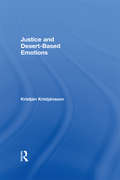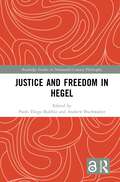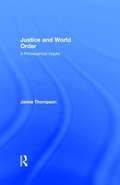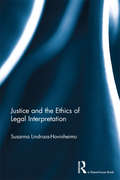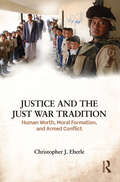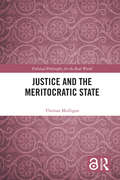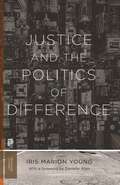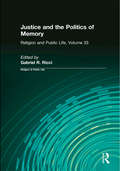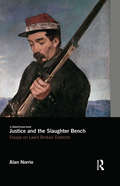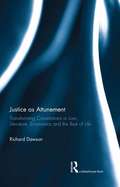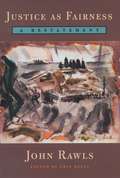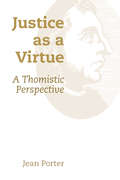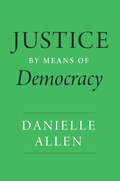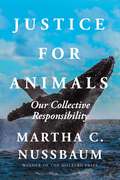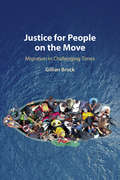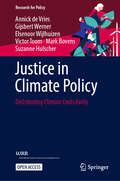- Table View
- List View
Justice Interruptus: Critical Reflections on the "Postsocialist" Condition
by Nancy FraserRefuting the argument to choose between "the politics of recognition" and the "politics of redistribution," Justice Interruptus integrates the best aspects of both. ********************************************************* ** What does it mean to think critically about politics at a time when inequality is increasing worldwide, when struggles for the recognition of difference are eclipsing struggles for social equality, and when we lack any credible vision of an alternative to the present order? Philosopher Nancy Fraser claims that the key is to overcome the false oppositions of "postsocialist" commonsense. Refuting the view that we must choose between "the politics of recognition" and the "politics of redistribution," Fraser argues for an integrative approach that encompasses the best aspects of both.
Justice Is an Option: A Democratic Theory of Finance for the Twenty-First Century (Chicago Studies in Practices of Meaning)
by Robert MeisterMore than ten years after the worst crisis since the Great Depression, the financial sector is thriving. But something is deeply wrong. Taxpayers bore the burden of bailing out “too big to fail” banks, but got nothing in return. Inequality has soared, and a populist backlash against elites has shaken the foundations of our political order. Meanwhile, financial capitalism seems more entrenched than ever. What is the left to do? Justice Is an Option uses those problems—and the framework of finance that created them—to reimagine historical justice. Robert Meister returns to the spirit of Marx to diagnose our current age of finance. Instead of closing our eyes to the political and economic realities of our era, we need to grapple with them head-on. Meister does just that, asking whether the very tools of finance that have created our vastly unequal world could instead be made to serve justice and equality. Meister here formulates nothing less than a democratic financial theory for the twenty-first century—one that is equally conversant in political philosophy, Marxism, and contemporary politics. Justice Is an Option is a radical, invigorating first page of a new—and sorely needed—leftist playbook.
Justice Is an Option: A Democratic Theory of Finance for the Twenty-First Century (Chicago Studies in Practices of Meaning)
by Robert MeisterMore than ten years after the worst crisis since the Great Depression, the financial sector is thriving. But something is deeply wrong. Taxpayers bore the burden of bailing out “too big to fail” banks, but got nothing in return. Inequality has soared, and a populist backlash against elites has shaken the foundations of our political order. Meanwhile, financial capitalism seems more entrenched than ever. What is the left to do? Justice Is an Option uses those problems—and the framework of finance that created them—to reimagine historical justice. Robert Meister returns to the spirit of Marx to diagnose our current age of finance. Instead of closing our eyes to the political and economic realities of our era, we need to grapple with them head-on. Meister does just that, asking whether the very tools of finance that have created our vastly unequal world could instead be made to serve justice and equality. Meister here formulates nothing less than a democratic financial theory for the twenty-first century—one that is equally conversant in political philosophy, Marxism, and contemporary politics. Justice Is an Option is a radical, invigorating first page of a new—and sorely needed—leftist playbook.
Justice Is an Option: A Democratic Theory of Finance for the Twenty-First Century (Chicago Studies in Practices of Meaning)
by Robert MeisterMore than ten years after the worst crisis since the Great Depression, the financial sector is thriving. But something is deeply wrong. Taxpayers bore the burden of bailing out “too big to fail” banks, but got nothing in return. Inequality has soared, and a populist backlash against elites has shaken the foundations of our political order. Meanwhile, financial capitalism seems more entrenched than ever. What is the left to do? Justice Is an Option uses those problems—and the framework of finance that created them—to reimagine historical justice. Robert Meister returns to the spirit of Marx to diagnose our current age of finance. Instead of closing our eyes to the political and economic realities of our era, we need to grapple with them head-on. Meister does just that, asking whether the very tools of finance that have created our vastly unequal world could instead be made to serve justice and equality. Meister here formulates nothing less than a democratic financial theory for the twenty-first century—one that is equally conversant in political philosophy, Marxism, and contemporary politics. Justice Is an Option is a radical, invigorating first page of a new—and sorely needed—leftist playbook.
Justice and Care: Essential Readings in Feminist Ethics
by Virginia Held<p>When feminist philosophers first turned their attention to traditional ethical theory, its almost exclusive emphasis upon justice, rights, abstract rationality, and individual autonomy came under special criticism. Women's experiences seemed to suggest the need for a focus on care, empathetic relations, and the interdependence of persons. <p>The most influential readings of what has become an extremely lively and fruitful debate are reproduced here along with important new contributions by Alison Jaggar and Sara Ruddick. As this volume testifies, there is no agreement on the important questions about the relationship between justice and care, but the debate has deepened and enriched our understanding in many ways.Justice and Care is a valuable collection of readings—an essential tool for anyone studying the state of feminist thought in particular or ethical theory in general.</p>
Justice and Desert-Based Emotions
by Kristján KristjánssonThe clear message proposed in this book is that justice matters for morality and desert matters for justice - and that emotions matter for desert, justice and morality. Moreover, and no less importantly, justice education needs to take all those facts into consideration. Kristján Kristjánsson’s new book falls on the cutting edge of the latest developments in justice discourse, both in philosophy and in the social sciences. Written from a philosophical perspective, it gives an accessible but penetrating exploration of various interlocking and interdisciplinary themes relating to justice. Kristjánsson justifies the necessary interplay between philosophers and social scientists dealing with justice, probes the role of desert in justice and explains the rising interest in the emotionality of justice. He then analyses the main desert-based emotions, connects his discussion to recent trends in developmental and social psychology, offers a moral justification of desert and desert-based emotions, and concludes by applying all those ideas in a close study of how justice and desert should be handled in moral education at school. Kristjánsson deftly weaves together insights from disparate academic areas relevant for justice, in general, and desert, in particular. This is an engaging, eye-opening and provocative book that should excite anyone interested in justice discourse and help generate debate in different areas related to justice: philosophical, psychological and educational.
Justice and Freedom in Hegel (Routledge Studies in Nineteenth-Century Philosophy)
by Andrew Buchwalter Paolo Diego BubbioThis volume explores the relationship between justice and freedom in Hegel’s practical philosophy, with a particular focus on the pivotal concept of reciprocal recognition. The contributors analyze the intersubjective relations between individuals and institutions through the lens of Hegel and demonstrate how his account of justice and freedom can be applied to address pressing issues in political philosophy.Despite extensive scrutiny of the concept of justice by political philosophers, Hegel’s unique account has been notably overlooked. What sets Hegel apart is his emphasis on the inseparable link between justice and freedom. Freedom is inextricably tied to an account of just social relations and institutions, while justice itself is intertwined with a robust endorsement of freedom. The chapters comprising this volume examine three crucial dimensions of Hegel’s framework for freedom and justice. First, the contributors address how Hegel’s distinctive integration of freedom and justice sheds new light on the nature of his practical philosophy. Second, they relate Hegel’s theory to other prominent accounts of justice, including Rawlsian forms of Kantian constructivism, Habermas’ neo‑Kantian discourse theory, republican views, neo‑Aristotelian accounts, and critical theory approaches. Finally, the contributors apply Hegel’s reconstructed theory of justice to ongoing debates encompassing criminal justice, distributive justice, global justice, environmental justice, and issues related to racial and gender justice, as well as populism.Justice and Freedom in Hegel will appeal to scholars and advanced students engaged in research on Hegel’s practical philosophy, 19th‑century philosophy, and political philosophy.
Justice and World Order: A Philosophical Inquiry
by Janna ThompsonThe political changes of recent years and the problems of poverty, the environment and nationalism have led to calls for the establishment of a just world order. But what would such a world be like? This book considers the concept of international justice as it has developed in traditional political theory from Hobbes to Marx and in contemporary writing on the subject. It develops a theory of international justice designed to take account of both individual freedom and the differences among communities.
Justice and the Ethics of Legal Interpretation
by Susanna Lindroos-HovinheimoJustice and the Ethics of Legal Interpretation addresses how it is that legal texts -laws, statutes and regulations – can, and do have meaning. Conventionally, legal decisions are justified with reference to language. But since language is always open to interpretation, and so cannot fully justify any legal decision, there is a responsibility that is inherent in legal interpretation itself. In this book, Susanna Lindroos-Hovinheimo uncovers and analyses this responsibility – which, she argues, is not limited by the text that is being interpreted (and through its mediation, by the legal system). It is not simply a responsibility to read well; it implies a responsibility for the effects of the interpretation in a particular situation and with regard to those whose case is being decided. Ultimately, it is a responsibility to do justice. It is these two aspects of responsibility that are conceptualised here as the two key dimensions of the ethics of legal interpretation: the textual and the situational. Drawing on the work of Wittgenstein, Gadamer, Derrida and Levinas, Justice and the Ethics of Legal Interpretation offers a fresh approach to long-standing questions about language and meaning in law. It will be of enormous value to those with interests in jurisprudence and legal theory.
Justice and the Just War Tradition: Human Worth, Moral Formation, and Armed Conflict
by Christopher J. EberleJustice and the Just War Tradition articulates a distinctive understanding of the reasons that can justify war, of the reasons that cannot justify war, and of the role that those reasons should play in the motivational and attitudinal lives of the citizens, soldiers, and statesmen who participate in war. Eberle does so by relying on a robust conception of human worth, rights, and justice. He locates this theoretical account squarely in the Just War Tradition. But his account is not merely theoretical: Justice and the Just War Tradition has a variety of practical aims, one of the most important of which is to serve as an aid to moral formation. The hope is that citizens, soldiers, and statesmen whose emotions and aspirations have been shaped by the Just War Tradition will be able to negotiate violent communal conflict in ways that respect the demands of justice. So Justice and the Just War Tradition articulates a theoretically satisfying and practically engaging account of the reasons that count in favor of war. Moreover, Eberle develops that account by engaging contemporary theorists, both philosophical and theological, by according due deference to venerable contributors to the Just War Tradition, and by integrating insights from military memoire, the history of war, and the author's experience of teaching ethics at the United States Naval Academy.
Justice and the Meritocratic State (Political Philosophy for the Real World)
by Thomas MulliganLike American politics, the academic debate over justice is polarized, with almost all theories of justice falling within one of two traditions: egalitarianism and libertarianism. This book provides an alternative to the partisan standoff by focusing not on equality or liberty, but on the idea that we should give people the things that they deserve. Mulligan sets forth a theory of economic justice—meritocracy—which rests upon a desert principle and is distinctive from existing work in two ways. First, meritocracy is grounded in empirical research on how human beings think, intuitively, about justice. Research in social psychology and experimental economics reveals that people simply don’t think that social goods should be distributed equally, nor do they dismiss the idea of social justice. Across ideological and cultural lines, people believe that rewards should reflect merit. Second, the book discusses hot-button political issues and makes concrete policy recommendations. These issues include anti-meritocratic bias against women and racial minorities and the United States’ widening economic inequality. Justice and the Meritocratic State offers a new theory of justice and provides solutions to our most vexing social and economic problems. It will be of keen interest to philosophers, economists, and political theorists.
Justice and the Politics of Difference (Princeton Classics Ser. #122)
by Iris Marion YoungIn this classic work of feminist political thought, Iris Marion Young challenges the prevailing reduction of social justice to distributive justice. It critically analyzes basic concepts underlying most theories of justice, including impartiality, formal equality, and the unitary moral subjectivity. The starting point for her critique is the experience and concerns of the new social movements about decision making, cultural expression, and division of labor--that were created by marginal and excluded groups, including women, African Americans, and American Indians, as well as gays and lesbians. Iris Young defines concepts of domination and oppression to cover issues eluding the distributive model. Democratic theorists, according to Young do not adequately address the problem of an inclusive participatory framework. By assuming a homogeneous public, they fail to consider institutional arrangements for including people not culturally identified with white European male norms of reason and respectability. Young urges that normative theory and public policy should undermine group-based oppression by affirming rather than suppressing social group difference. Basing her vision of the good society on the differentiated, culturally plural network of contemporary urban life, she argues for a principle of group representation in democratic publics and for group-differentiated policies. Danielle Allen's new foreword contextualizes Young's work and explains how debates surrounding social justice have changed since--and been transformed by--the original publication of Justice and the Politics of Difference.
Justice and the Politics of Memory: Religion And Public Life (Religion And Public Life Ser. #Vol. 33)
by Gabriel R. RicciMemory is not a mere repository for past events. This was Henri Bergson's fundamental claim about consciousness. In distinguishing our psychic constitution by its sense of the past, Bergson differentiates our perception of time from a process in which one instant merely replaces another. While Bergson cast his ideas in terms of the biological sciences, his analysis did not neglect the moral impulse that accompanies the condensation of history with which we continuously live. Classifying human existence in this way bears on ethical and political questions. How such questions can plague the memory of a people and the entire human community is addressed in Justice and the Politics of Memory. The contributors explore the manner in which cultural and psychic violation undermine collective identity, and destroy traditions. They raise troubling questions on how recompense and reconciliation is possible after abominable wrongs have been systematically perpetrated against a community. Faced with the burden of memory, those committed to the righting of wrongs are faced with pursuing an elusive justice that sometimes includes levying reparations and memorializing horrific historical episodes. Guided by the muse of forgiveness, restoration and a more harmonious future are likely to be rooted in the sources of spirituality that had been previously eclipsed by the conquering and homogenizing historical processes. This volume includes Heribert Adam's "Collective Reckoning with a Criminal Regime," Jeffrey Olick's "Lessons from and for Germany," James Hatley's "Levinas, Witness and Politics," James E. Young's "Germany's Holocaust Memorial Problem--and Mine," Tim Giago's "Killing the Indian to Save the Child: The Near Death of Spirituality," Jordan B. Peterson's and Maja Djikic's "Running Ahead: You Can Neither Remember Nor Forget What You Do Not Understand," Derick Wilson's "Where Religion Confuses yet Faith Gives Hope: Conflict Resolution in Northern Ireland," and Leonard Kaplan's "Justice Perfected: Cinematic Exemplifications," and an introduction, "Morality and Memory," by the editor.
Justice and the Slaughter Bench: Essays on Law's Broken Dialectic
by Alan NorrieIn this follow-up to Law and the Beautiful Soul, Alan Norrie addresses the split between legal and ethical judgment. Shaped by history, law’s formalism both eschews and requires ethics. The first essays consider legal form in its practical aspect, and the ethical problems encountered (‘law’s architectonic’). The later essays look at the complex underlying relation between law and ethics (‘law’s constellation’). In Hegel’s philosophy, legal and ethical judgment are brought together in a rational totality. Here, the synthesis remains unachieved, the dialectic systematically ‘broken’. These essays cover such issues as criminal law’s ‘general part’, homicide reform, self-defence, euthanasia, and war guilt. They interrogate legal problems, consider law’s method, and its place in the social whole. The analysis of law’s historicity, its formalism and its relation to ethics contributes importantly to central questions in law, legal theory and criminal justice.
Justice as Attunement: Transforming Constitutions in Law, Literature, Economics and the Rest of Life
by Richard DawsonThe meaning of an expression resides not in the expression itself but in the experience of a person’s engagement with it. Meaning will be different not only to different people but also to the same person at different times. This book offers a way of attending to these different meanings. This way (or method) is a version of a trans-cultural activity that Richard Dawson calls attunement. The activity of attunement involves a movement of self-adjustment to a language, which a person transforms in her or his use of it. Consciously performing the activity can enable understanding of the processes by which we constitute ourselves and others when we use a language. This directly connects to the topic justice, which is concerned with constituting appropriate selves and relations. Justice as Attunement engages with a wide range of texts – legal, literary, economic, philosophical, among others – and illuminates many useful and fascinating connections between them. There is a sense in which this book transcends disciplinary boundaries, for, in addition to students and scholars of law, literature, economics, and philosophy, it is written to a general reader who is interested in reflecting on and doing justice to their experiences in life.
Justice as Fairness: A Restatement (Reprints In Philosophy Ser.)
by John RawlsThis book originated as lectures for a course on political philosophy that Rawls taught regularly at Harvard in the 1980s. In time the lectures became a restatement of his theory of justice as fairness, revised in light of his more recent papers and his treatise Political Liberalism (1993). As Rawls writes in the preface, the restatement presents "in one place an account of justice as fairness as I now see it, drawing on all [my previous] works." He offers a broad overview of his main lines of thought and also explores specific issues never before addressed in any of his writings. Rawls is well aware that since the publication of A Theory of Justice in 1971, American society has moved farther away from the idea of justice as fairness. Yet his ideas retain their power and relevance to debates in a pluralistic society about the meaning and theoretical viability of liberalism. This book demonstrates that moral clarity can be achieved even when a collective commitment to justice is uncertain.
Justice as a Virtue: A Thomistic Perspective
by Jean Porter“Aquinas,” says Jean Porter, “gets justice right.” In this book she shows that Aquinas offers us a cogent and illuminating account of justice as a personal virtue rather than a virtue of social institutions, as John Rawls and his interlocutors have described it — and as most people think of it today. Porter presents a thoughtful interpretation of Aquinas’s account of the complex virtue of justice as set forth in the Summa theologiae, focusing on his key claim that justice is a perfection of the will. Building on her interpretation of Aquinas on justice, Porter also develops a constructive expansion of his work, illuminating major aspects of Aquinas’s views and resolving tensions in his thought so as to draw out contemporary implications of his account of justice that he could not have anticipated.
Justice as a Virtue: A Thomistic Perspective
by Jean Porter&“Aquinas,&” says Jean Porter, &“gets justice right.&” In this book she shows that Aquinas offers us a cogent and illuminating account of justice as a personal virtue rather than a virtue of social institutions, as John Rawls and his interlocutors have described it — and as most people think of it today. Porter presents a thoughtful interpretation of Aquinas&’s account of the complex virtue of justice as set forth in the Summa theologiae, focusing on his key claim that justice is a perfection of the will. Building on her interpretation of Aquinas on justice, Porter also develops a constructive expansion of his work, illuminating major aspects of Aquinas&’s views and resolving tensions in his thought so as to draw out contemporary implications of his account of justice that he could not have anticipated.
Justice by Means of Democracy
by Danielle AllenFrom leading thinker Danielle Allen, a bold and urgent articulation of a new political philosophy: power-sharing liberalism. At a time of great social and political turmoil, when many residents of the leading democracies question the ability of their governments to deal fairly and competently with serious public issues, and when power seems more and more to rest with the wealthy few, this book reconsiders the very foundations of democracy and justice. Scholar and writer Danielle Allen argues that the surest path to a just society in which all are given the support necessary to flourish is the protection of political equality; that justice is best achieved by means of democracy; and that the social ideals and organizational design principles that flow from recognizing political equality and democracy as fundamental to human well-being provide an alternative framework not only for justice but also for political economy. Allen identifies this paradigm-changing new framework as “power-sharing liberalism.” Liberalism more broadly is the philosophical commitment to a government grounded in rights that both protect people in their private lives and empower them to help govern public life. Power-sharing liberalism offers an innovative reconstruction of liberalism based on the principle of full inclusion and non-domination—in which no group has a monopoly on power—in politics, economy, and society. By showing how we all might fully share power and responsibility across all three sectors, Allen advances a culture of civic engagement and empowerment, revealing the universal benefits of an effective government in which all participate on equal terms.
Justice for Animals: Our Collective Responsibility
by Martha C. NussbaumA revolutionary new theory and call to action on animal rights, ethics, and law from the renowned philosopher Martha C. Nussbaum.Animals are in trouble all over the world. Whether through the cruelties of the factory meat industry, poaching and game hunting, habitat destruction, or neglect of the companion animals that people purport to love, animals suffer injustice and horrors at our hands every day. The world needs an ethical awakening, a consciousness-raising movement of international proportions. In Justice for Animals, one of the world&’s most influential philosophers and humanists Martha C. Nussbaum provides a revolutionary approach to animal rights, ethics, and law. From dolphins to crows, elephants to octopuses, Nussbaum examines the entire animal kingdom, showcasing the lives of animals with wonder, awe, and compassion to understand how we can create a world in which human beings are truly friends of animals, not exploiters or users. All animals should have a shot at flourishing in their own way. Humans have a collective duty to face and solve animal harm. An urgent call to action and a manual for change, Nussbaum&’s groundbreaking theory directs politics and law to help us meet our ethical responsibilities as no book has done before.
Justice for Earthlings
by David MillerIn the past few decades social changes have impacted how we understand justice, as societies become both more multicultural and more interconnected globally. Much philosophical thought, however, seems to proceed in isolation from these developments. While philosophers from Plato onwards have portrayed justice as an abstract, universal ideal, Miller argues that principles of justice are always rooted in particular social contexts, and connects these ideas to the changing conditions of human life. In this important contribution to political philosophy, it is argued that philosophers need to pay more attention to the way that people actually think about what's fair, and only defend principles that are feasible to apply in the real world. To understand equality of opportunity, for example, we must explore the cultural constraints that people face when presented with life choices. Justice for Earthlings also explains how national boundaries make justice at global level different from social justice.
Justice for Hedgehogs
by Ronald DworkinThe fox knows many things, the Greeks said, but the hedgehog knows one big thing. In his most comprehensive work, Dworkin argues that value in all its forms is one big thing; that what truth is, life means, morality requires, and justice demands are different aspects of the same large question.
Justice for People on the Move: Migration in Challenging Times
by Gillian BrockBy executive order, the US has adopted an immigration policy that looks remarkably similar to a Muslim ban, and there are new threats to deport long-settled residents, such as the so-called Dreamers. Our defunct refugee system has not dealt adequately with increased refugee flows, forcing desperate people to undertake increasingly risky measures in efforts to reach safe havens. Meanwhile increased migration flows over recent years appear to have contributed to a rise in right-wing populism, apparently driving phenomena such as Brexit and Trumpism. In this original and insightful book Gillian Brock offers answers and tools that assist us in evaluating current migration policy and in helping to determine which policies may be permissible and which are normatively indefensible. She offers a comprehensive framework for responding to the many challenges which have recently emerged, and for delivering justice for people on the move along with those affected by migration.
Justice in Climate Policy: Distributing Climate Costs Fairly (Research for Policy)
by Mark Bovens Victor Toom Annick de Vries Gijsbert Werner Elsenoor Wijlhuizen Suzanne HulscherThis open access book is looking into ways to achieve just climate policy within a country. The authors of this monograph share a unique, timely and original vision: continuous support for climate policy is more likely to emerge when citizens find that the distribution of the bill for climate costs is fair. But what is a fair distribution of climate costs? This is an important question because financial costs of mitigation (reducing greenhouse gases), adaptation (adapting to climate change) and damage (compensating or compensating after weather extremes) increase significantly in the coming decades. Drawing on philosophy and ethics, the authors propose ten principles for achieving just distributions of domestic climate costs. Examples of such principles are individual responsibility, the polluter pays, greatest utility and capacity to pay. Yet what a fair distribution is, depends on, for example, political preferences and the policy issue at hand. Empirical research on designing climate policies, however, shows that distributive principles are not part of the political, policy, and public discussions. The authors therefore argue that explicit attention to principles of just distribution at the start of a policy process contributes to support for climate policy. This book provides tools to professionals and students to achieve justice in climate policy.
